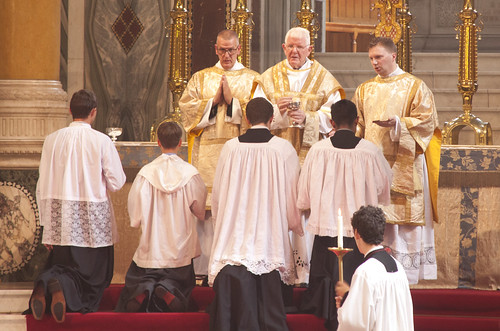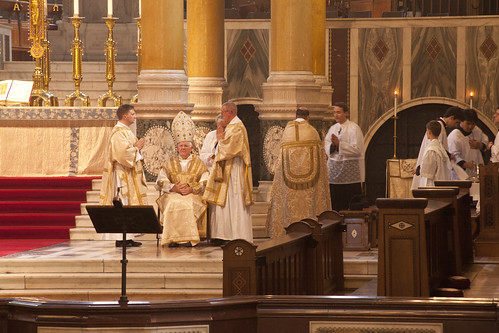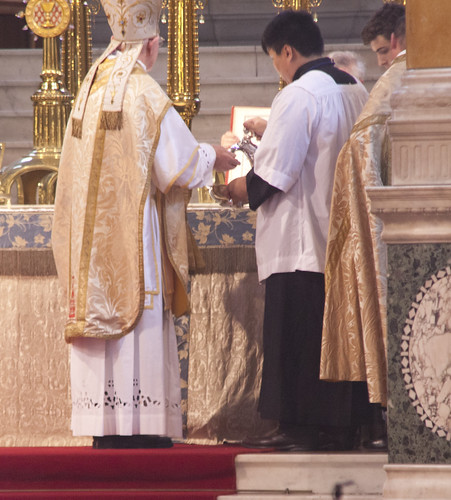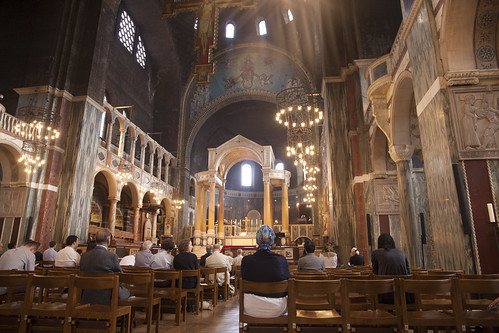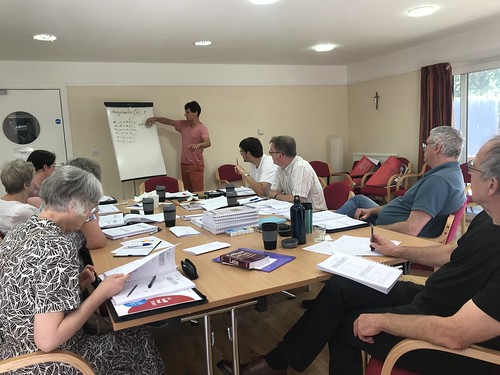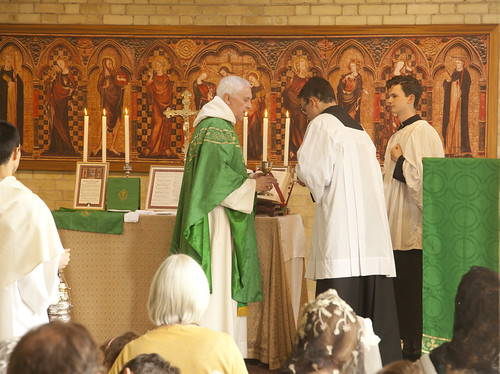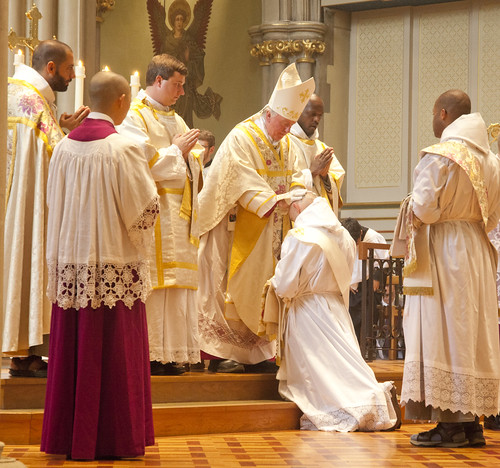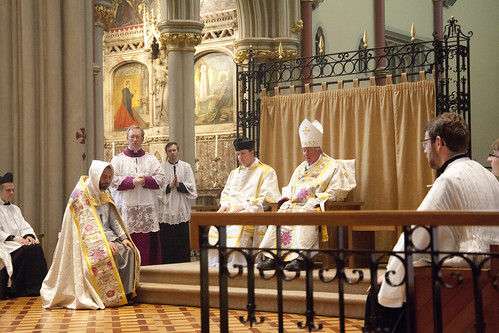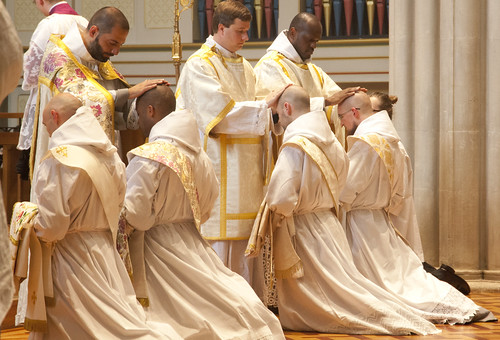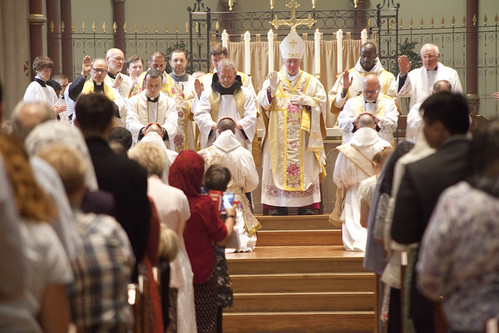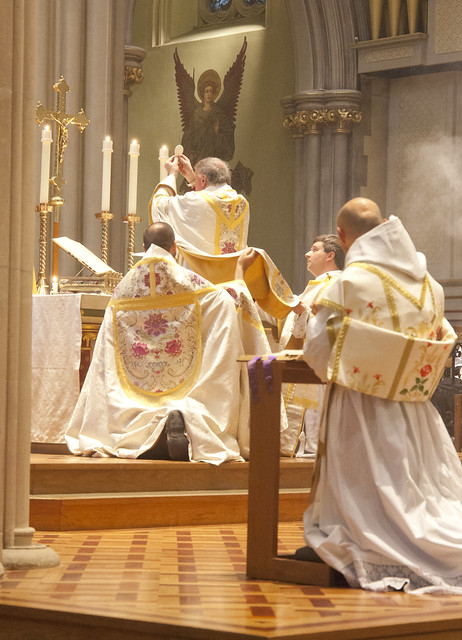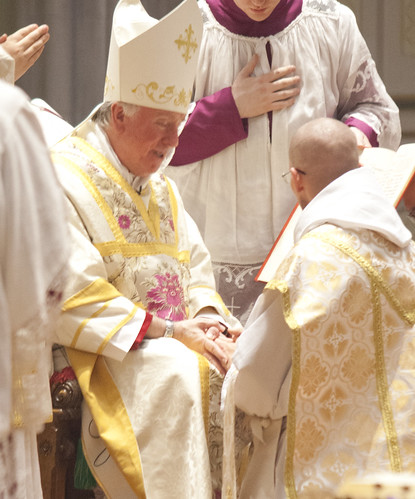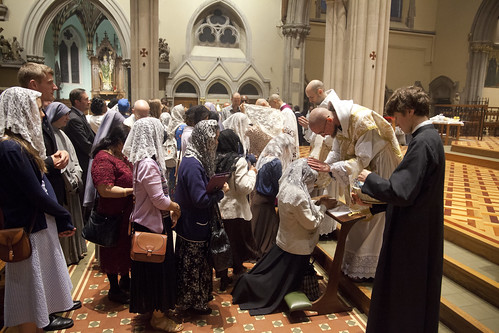Chairman's Blog
New Mass of Ages
 In this issue:
In this issue:
• We celebrate the Ordination of four men, in the Traditional Rite, by Bishop Philip Egan in his Cathedral in Portsmouth • Joseph Shaw explains the ‘Confirmation slap’
• A selection of pictures from our recent pilgrimage to Holywell
• Maurice Quinn remembers the Dorset men who died for the Faith – the Chideock Martyrs
• Jonathan Luxmoore explains why Polish Catholics rally to their Church undeterred by a new crisis
• Fr Lawrence Lew OP on the traditional liturgy and Catholic masculinity
• Joseph Shaw explains how Catholic Linguistic Survivals from the Ancient Liturgy are embedded in the fabric of our lives
Schola Sainte-Cécile in England 2019
Review of Stephen Bullivant in Catholic Herald
I'm late posting this on here but my latest in the Catholic Herald is a review of Mass Exodus by Stephen Bullivant. It begins:
Was Vatican II in some way responsible for declining Catholic practice and “affiliation” (people calling themselves Catholics), or is this phenomenon a matter of trends beyond the Church’s control? Focusing on Britain and the United States, Professor Stephen Bullivant, a sociologist of religion at St Mary’s University, London, presents the evidence with precision, while still producing a highly readable book. The thesis of Mass Exodus is that the Church, like other ecclesial bodies, has clearly faced considerable headwinds since the 1960s as a result of wider social forces, but has also made things worse for itself.
Bullivant’s analysis revolves around three key sociological concepts. The first is the role of networks in nurturing belief, or “social network theory”. The denser the social network of believers, the more they are connected with each other (as opposed to non-believers), and the lower will be the rate of lapsation and disaffiliation. The Amish, for example, with their distinctive way of life and close-knit community, have a very low level of disaffiliation. Catholics were never like them, but up to the 1960s there was, to some degree, a “Catholic ghetto” in both the US and Britain where, in a hostile world, they had social support from fellow believers. The community was marked out by customs such as eating fish on Friday, distinctive forms of worship and spirituality, and interest in a common history, particularly of persecution.
Carry on reading.
Two ideas for stemming lapsation
AGM Mass in Westminster Cathedral
People are not quite so starved of the Traditional Mass today, and this one Mass doesn't attractice such an enormous crowd. About that many people, by my estimation, attend a Latin Mass on any given Sunday. Many of those at the Mass in 1972 probably hadn't attended any for a year or more. Indeed, most Masses were celebrated in the vernacular from 1965, and at the same time the rubrics and prayers began to chance quite radically.
It is a reflection of the febrile atmosphere that the report of this Mass in 1972 is the first mention the Catholic Herald made to the 'Indult granted last year to England and Wales by the Pope at the Cardinal's request'. Why hadn't they mentioned it when it was granted? It had been reported in full in The Times, whose editor, William Rees-Mogg, was one of the petitioners, along with Agatha Christi, asking for it. The Catholic papers were told to keep it quiet.
Although not as well-attended as in 1972, our AGM was, as always, a jolly affair. We provide sandwich lunch (with wine) to attendees (on payment of a nominal £5) and it is a chance for anyone to talk to the Society's Officers (and staff) formally, at the meeting, or informally, over lunch. We were addressed by Bishop Campbell who gave us a little talk about St Augustine of Hippo: he is an Augustinian. We look forward to seeing him again at the Annual Requiem in Westminster Cathedral, which falls on All Souls Day this year.
Support the Latin Mass Society
Why do people lapse? More from Stephen Bullivant
 My latest on LifeSiteNews. This post focuses on a shorter book of Prof Bullivant, which has also come out this year. One of the interesting and perhaps counter-intuitive results of the survey of lapsed Catholics he carried out for Portsmouth Diocese is that the lapsed are not all what you might call liberal ex-Catholics: they include a fair number of conservative or even traditionalist ex-Catholics. I think it might be tempting to think of the more conservative type of Catholic as the core vote who are least likely to leave, people with a higher level of committment. The truth is more complicated. People who want traditional liturgy, beautiful churches, and clear teaching, can lose heart and lapse. Indeed, 10% of respondents even agreed (or 'strongly agreed') with the statement 'I prefer the Latin Mass but there is none in my area.'
My latest on LifeSiteNews. This post focuses on a shorter book of Prof Bullivant, which has also come out this year. One of the interesting and perhaps counter-intuitive results of the survey of lapsed Catholics he carried out for Portsmouth Diocese is that the lapsed are not all what you might call liberal ex-Catholics: they include a fair number of conservative or even traditionalist ex-Catholics. I think it might be tempting to think of the more conservative type of Catholic as the core vote who are least likely to leave, people with a higher level of committment. The truth is more complicated. People who want traditional liturgy, beautiful churches, and clear teaching, can lose heart and lapse. Indeed, 10% of respondents even agreed (or 'strongly agreed') with the statement 'I prefer the Latin Mass but there is none in my area.'
You know how many lapsed Catholics there are? The massive and authoritative British Social Attitudes Survey indicates that there are 3.7 million in the UK. If anything like 10% of these, plus who knows what percentage of practicing Catholics, prefer the Latin Mass, even when most Catholics under 70 do not even know what it is like, then our bishops are clearly missing a trick in not making sure it is available.
-----------
Prof Bullivant on What Went Wrong after Vatican II
I'm going to be writing more about Prof Bullivant's new book, Mass Exodus, which examines the catastrophic decline of Catholic affiliation and practice since the Second Vatican Council, from a sociological point of view.
Here is a piece I have written for LifeSiteNews.
LMS Latin Course: book now
For details and booking see the LMS website here.
Dates: 29th July to 2nd August 2019
The Latin Mass Society’s Residential Latin Course for adults is an intensive course, taught by two experienced tutors, focusing on the Latin of the liturgy.
It is ideal for priests and seminarians wishing to improve their Latin, and all clerics and seminarians (and those about to enter seminary) enjoy a 50% discount on the course fees, which are extremely low anyway.
They are joined by lay men and women who wish to engage more closely with the ancient Latin liturgy, or do studies involving Latin.
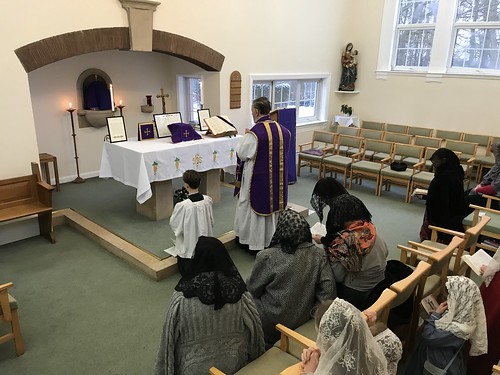 |
| Mass celebrated by Fr John Hunwicke at Boars Hill for the Guild of St Clare sewing retreat |
The Dominican Rite in Cambridge
On Sunday, a First Holy Communion took me to Cambridge Blackfriars, a place I have not visited before. The Dominican priory churches in Oxford, London, and Leicester, where I have attended Mass, are large and impressive neo-gothic buildings; for various reasons the Cambridge Blackfriars is very modest. The chapel was, I am told, originally intended as a lecture-room, but plans for a chapel elsewhere were shelved for various reasons.
Nonetheless, the chapel was packed, and a beautiful Mass was celebrated by Fr Aidan Nichols OP, and accompanied by a five-strong local schola. This Mass, at 9:15am, takes place every Sunday, either Sung or Low.
Friars ordained by Bishop Egan: photos
Last night Bishop Philip Egan ordained four members of the Franciscan community based in Gosport, in his cathedral in Portsmouth: St John's. I was there.
The community at Gosport is called the Family of Mary Immaculate and St Francis. This is an institute of diocesan right established by Bishop Egan, and the superior is Fr Serafino Lanzetta. At their parish in Gosport, which comprises St Mary's and St Columba's churches, they celebrate both Forms of the Roman Rite. The ordinations took place in the older Rite. The new priests are Fr Philomeno and Fr Rosario, who will be familiar to readers who have attended the LMS Walsingham Pilgrimage, and Fr Faustino and Fr Michele.
Support the Latin Mass Society

